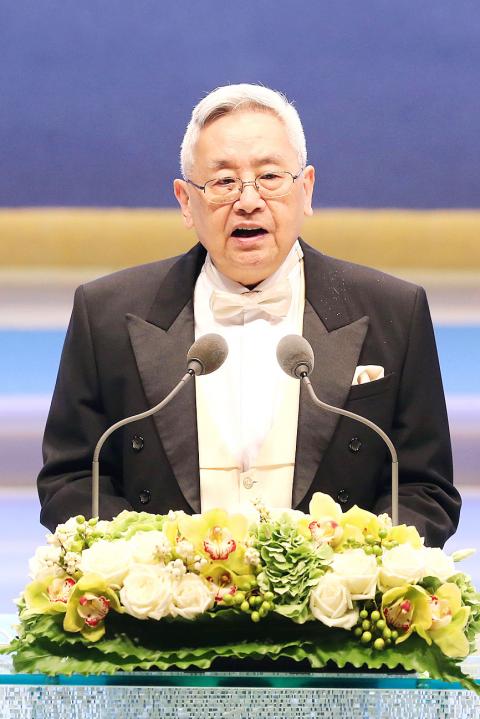Chinese-American historian and Tang Prize laureate Yu Ying-shih (余英時) yesterday reiterated his support for and admiration of Taiwan’s Sunflower movement.
“I was very touched by the Sunflower movement a while ago… the students did not leave the legislature until they thoroughly cleaned up the place and they left peacefully,” the Princeton University emeritus professor said during a talk in Taipei on the importance of cultivating humanistic qualities in modern society.
“It was a remarkable movement,” the 84-year-old China-born academic said.

Photo: CNA
The Sunflower movement refers to student-led protests in March and April this year against the way a trade in services agreement with China was handled by the Chinese Nationalist Party (KMT) government. The protesters occupied the legislature for almost 23 days and at one point stormed the Executive Yuan building, drawing mixed but mostly sympathetic reactions from the media.
In a press conference a day earlier, Yu, although approving of the students’ opposition, stopped short of expressing full support for the demonstrations, saying he is against “violent protests” in a democratic society.
In yesterday’s speech, Yu said that he had no intentions of “appeasing” people or asking them “not to rebel.”
He said citizens in a democratic society should protest and express their dissatisfaction with the government, but in a peaceful way, because if all efforts fail, they can still resist the government with their ballots.
Yu, an outspoken critic of the Chinese government, said Taiwan’s democratization process has great significance in Chinese history because China’s dynastic changes and power shifts have always been compelled by military force.
Taiwan’s democracy broke that cycle of violence and counters the saying that Chinese culture is opposed to the ideas of democracy, freedom and equality, he said.
In fact, he said, the first people who brought the idea of democracy to China were academics influenced by Confucianism, such as Kang Youwei (康有為, 1858-1927) and Yan Fu (嚴復, 1854-1921), proving that traditional Chinese thinking was not against democracy.
The concept of democracy also appears in a book by Chinese scholar Huang Zongxi (黃宗羲, 1610-1695), in which Huang condemned autocratic rule and proposed using schools to hold discussions on public affairs, he said.
Yu is the first winner of the Tang Prize in Sinology. In addition to his scholarly pursuits, Yu is an outspoken supporter of the democracy movement in China and is known to have sheltered young refugees who fled China after the Tiananmen Square Massacre in 1989.

AGING: As of last month, people aged 65 or older accounted for 20.06 percent of the total population and the number of couples who got married fell by 18,685 from 2024 Taiwan has surpassed South Korea as the country least willing to have children, with an annual crude birthrate of 4.62 per 1,000 people, Ministry of the Interior data showed yesterday. The nation was previously ranked the second-lowest country in terms of total fertility rate, or the average number of children a woman has in her lifetime. However, South Korea’s fertility rate began to recover from 2023, with total fertility rate rising from 0.72 and estimated to reach 0.82 to 0.85 by last year, and the crude birthrate projected at 6.7 per 1,000 people. Japan’s crude birthrate was projected to fall below six,

Conflict with Taiwan could leave China with “massive economic disruption, catastrophic military losses, significant social unrest, and devastating sanctions,” a US think tank said in a report released on Monday. The German Marshall Fund released a report titled If China Attacks Taiwan: The Consequences for China of “Minor Conflict” and “Major War” Scenarios. The report details the “massive” economic, military, social and international costs to China in the event of a minor conflict or major war with Taiwan, estimating that the Chinese People’s Liberation Army (PLA) could sustain losses of more than half of its active-duty ground forces, including 100,000 troops. Understanding Chinese

US President Donald Trump in an interview with the New York Times published on Thursday said that “it’s up to” Chinese President Xi Jinping (習近平) what China does on Taiwan, but that he would be “very unhappy” with a change in the “status quo.” “He [Xi] considers it to be a part of China, and that’s up to him what he’s going to be doing, but I’ve expressed to him that I would be very unhappy if he did that, and I don’t think he’ll do that. I hope he doesn’t do that,” Trump said. Trump made the comments in the context

SELF-DEFENSE: Tokyo has accelerated its spending goal and its defense minister said the nation needs to discuss whether it should develop nuclear-powered submarines China is ramping up objections to what it sees as Japan’s desire to acquire nuclear weapons, despite Tokyo’s longstanding renunciation of such arms, deepening another fissure in the two neighbors’ increasingly tense ties. In what appears to be a concerted effort, China’s foreign and defense ministries issued statements on Thursday condemning alleged remilitarism efforts by Tokyo. The remarks came as two of the country’s top think tanks jointly issued a 29-page report framing actions by “right-wing forces” in Japan as posing a “serious threat” to world peace. While that report did not define “right-wing forces,” the Chinese Ministry of Foreign Affairs was